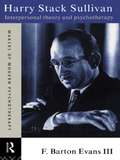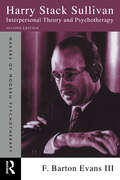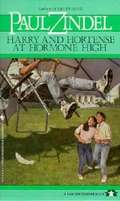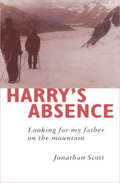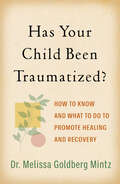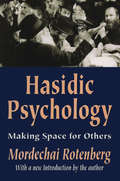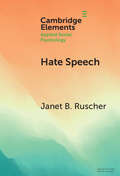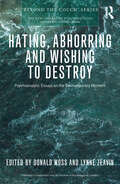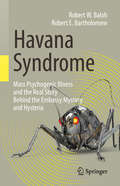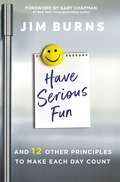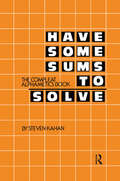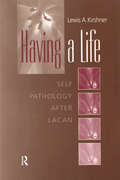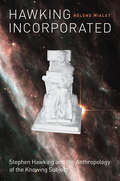- Table View
- List View
Harry Stack Sullivan: Interpersonal Theory and Psychotherapy (Makers of Modern Psychotherapy #3)
by F. Barton Evans IIIHarry Stack Sullivan (1892-1949) has been described as 'the most original figure in American psychiatry'. Challenging Freud's psychosexual theory, Sullivan founded the interpersonal theory of psychiatry, which emphasized the role of interpersonal relations, society and culture as the primary determinants of personality development and psychopathology. This concise and coherent account of Sullivan's work and life invites the modern audience to rediscover the provocative, groundbreaking ideas embodied in Sullivan's interpersonal theory and psychotherapy.
Harry Stack Sullivan: Interpersonal Theory and Psychotherapy (Makers of Modern Psychotherapy)
by F. Barton Evans IIIThis book covers the works and life of Harry Stack Sullivan (1892–1949), who has been described as "the most original figure in American psychiatry." Challenging Freud’s psychosexual theory, Sullivan founded the interpersonal theory of psychiatry, which emphasizes the role of interpersonal relations, society, and culture as the primary determinants of personality development and psychopathology. This concise and coherent account of Sullivan’s work and life invites the modern audience to rediscover the provocative, ground-breaking ideas embodied in Sullivan’s interpersonal theory and psychotherapy that continue to advance. This revised second edition is updated to reflect new research and ideas - such as an expanded section on Sullivan’s groundbreaking ideas about homosexuality and new sections on his concept of anxiety in infancy and on psychological trauma and how interpersonal theory impacts attachment theory, human sexuality, psychopathology, personality assessment, psychotherapy, and social issues. This book, which has been a primary resource on Sullivan’s works for over 25 years, will continue to be of interest to a range of psychotherapy professionals and practitioners including beginning and experienced psychotherapists, psychological assessment practitioners, interpersonal researchers, and teachers of personality theory.
Harry and Hortense at Hormone High
by Paul ZindelSophomores Harry and Hortense are convinced they're the only enlightened people in their messed-up, miserable high school, which Harry's nicknamed Hormone High.
Harry's Absence: Looking for My Father on the Mountain
by Jonathan ScottOn February 1, 1960, Harry Scott, conscientious objector, psychologist, and mountaineer, was killed while climbing Mt. Cook. Thirty-five years later, his son set out to look for him. Funny, moving, and beautifully written, this is the story of a father's absence, told partly through the rich and exciting mix of biography, autobiography, and intellectual and social history. HARRY'S ABSENCE is a passionately argued book about New Zealand, addressing the distinction between nationalism and love of country. Finally, it is a recovery, from death, of reasons for living.
Hart On Responsibility
by Christopher PulmanA collection of essays discussing Herbert Hart's writings on responsibility. The essays focus upon Hart's work on causation in the law and on the justification of punishment. Specific topics discussed include senses of 'responsibility', voluntariness, Mill's harm principle, mens rea, excuses, the Hart-Wootton debate, and negligence.
Has Your Child Been Traumatized?: How to Know and What to Do to Promote Healing and Recovery
by Melissa Goldberg MintzWhen a child has been through an upsetting or stressful event, it can feel overwhelming. Is my child traumatized? Are new behaviors normal, or signs of PTSD? What can I do to make my child feel safe again? In this wise and authoritative guide, psychologist Melissa Goldberg Mintz assures loving parents that the tools necessary for supporting a traumatized child are ones they already possess, from promoting recovery at home, to knowing when professional help is needed. Dr. Goldberg Mintz shares specific, critical information and insights into what trauma looks like at different ages, why some kids exposed to the same event react very differently, how to help a child through trauma triggers, and more. Most important, she shows parents how to ensure that kids don&’t feel constrained by fear--and can face future challenges with hope and resilience.
Hasidic Psychology: Making Space for Others
by Mordechai RotenbergInterest in the impact of ethical systems and social or religious ideologies on socio-behavioral patterns is a longstanding theme in social science research. While interest may have begun with Max Weber and his thesis of the relationship between the Protestant ethic and the spirit of capitalism, it extends far beyond this. Surprisingly, few studies have delved into the socio-behavioral patterns emanating from Jewish ethics. This book, with a new introduction by the author, fills that gap.As Hasidic Psychology makes clear, Jewish ethics are unique in many ways, especially in that they are essentially other-centered. Man's ability to affect his own future and interpersonal relations are explained according to the theory of contraction, popularized in Hasidic thought: God, by contracting Himself to evacuate space for the human world, bestowed upon man the power and responsibility to determine his own future, and even affect God's disposition.In the first part of the book, the sociological-structural concept of mono versus multiple ideal labeling is introduced. This concept refers to a social system in which diverse material and spiritual actualization patterns are structurally introduced as equal social ideals. In the second part, basic tenets of classic interaction and socialization are compared to the interpersonal perspective, and the contraction theory is explained as a process of "mutual emulation," whereby father and son affect each other. In the third part, a functional approach to deviance is developed through the Hasidic process known as "ascend via descend."
Hasta que te caigas bien: Trabaja en ti para estar orgullosa de quien eres
by Elizabeth Clapés (@esmipsicologa)Imagínate que pudieses elaborar un manual de cómo quieres ser y de cómo quieres que sea tu relación con los demás. ¿Qué pedirías? Cuando te enfadas o sientes emociones que te dificultan actuar racionalmente, reaccionas de manera impulsiva: pierdes los papeles, tomas malas decisiones o dices cosas de las que luego te arrepientes. Sin embargo, hay que parar a veces y preguntarse: «¿Qué haría ahora la persona que quiero ser?». Intentar comportarte acorde con tus valores es una forma de amor propio, pero para conseguirlo es imprescindible conocerte, saber quién quieres ser y actuar de forma consciente. Al fin y al cabo, la persona que mejor te tiene que caer en este mundo eres tú. Este libro va de: *Analizar tu infancia. *Conocer tu historia para entender cómo eres actualmente. *Tu familia y tus amistades. *Evaluar cómo son tus relaciones de pareja y aprendera relacionarte de forma sana. *Comprender por qué te vinculas como te vinculas y con qué tipo de personas tiendes a hacerlo. *Trabajar en ti para conseguir estar orgulloso/a de quien eres. *Cómo mejorar tu autoestima y autoconcepto. Los lectores de Querida yo: tenemos que hablar han dicho:«Lectura obligatoria y necesaria» «Imprescindible para nuestra vida» «Me ha transmitido que necesitaba quererme un poco más y así ha sido» «Este libro es un tesoro que hay que tener, leer y releer»
Hate Speech (Elements in Applied Social Psychology)
by Janet B. RuscherHate speech comprises any form of hateful or contemptuous expression that attacks, degrades, or vilifies people based on their social identities. This Element focuses on hate speech targeting social identities that are devalued by a society's dominant groups, and that is likely to evoke, promote, or legitimize harms such violence, discrimination, and oppression. After detailing the ways in which hate speech is expressed (e.g., through derogatory labels, metaphors, offensive imagery), the production of hate speech is explored at theindividual level (e.g., prejudiced attitudes), group level (e.g., realistic intergroup threat), and societal level (e.g., hierarchy maintenance; free speech protections). A discussion of the effects of blatant and anonymous hate speech on targets (e.g., anxiety and depression) and nontargets (e.g., stereotype activation; desensitization; fomenting violence) follows. Finally, the effectiveness of mitigation efforts isexplored, including use of computer-based technologies, speech codes, confrontation, and counterspeech.
Hate Speech in Social Media: Linguistic Approaches
by Isabel ErmidaThis edited book offers insight into the linguistic construction of prejudice and discrimination in social media. Drawing on the outputs of a three-year research project, NETLANG, involving scholars from five European countries (Portugal, Czech Republic, Estonia, Finland and Poland), as well as on external contributions from participants in the project’s final conference, the collection brings together a variety of linguistic approaches to the study of online hate speech, ranging from Pragmatics to Syntax, Lexis, Stylistics, Natural Language Processing (NLP) and Corpus Linguistics. Data from English, Portuguese, Danish, Lithuanian, Persian, Polish, and Slovenian are examined, along with various geopolitical contexts for hate speech, especially anti-refugee and anti-immigrant discourse. The authors explore a continuum of overt to covert textual data, namely: (i) structural elements, such as syntactic and morphological patterns found to recur throughout the texts; (ii) lexical and stylistic elements, revealing the often implicit ways vocabulary choices and rhetorical devices signal the expression of hate; and (iii) interactional elements, concerning the pragmatic relationships established in online communicative exchanges. The chapters cover numerous types of prejudice, such as sexism, nationalism, racism, antisemitism, religious intolerance, ageism, and homo/transphobia. The book will be of interest to an academic readership in Linguistics, Media Studies, Communication Studies, and Social Sciences.
Hate and Love in Pyschoanalytical Institutions
by Jurgen ReederIn Hate and Love in Psychoanalytic Institutions, Jurgen Reeder investigates the professional superego of the psychoanalyst. This superego designates a prescriptive and prohibiting role that the individual must play within the parameters of a certain occupational sphere.The prescriptive aspect works like a professional ideal, and in this respect the superego can be said to sustain a professional 'ethos' or spirit, commanding what the professional should know, and what his or her relations to clients and colleagues should resemble. It helps to bind the members of the analytical community together.The prohibiting aspect installs a vigilant inner eye. It offers necessary protection against detrimental aberrations, but it also evokes fantasies of critical or condemning colleagues who might have insight into what transpires within the walls of the analyst's own private practice--leading to a reluctance to communicate openly about the analytical experience. In this sense, the professional superego contributes to the 'paranoization' of collegial communication, a circumstance that has a hampering effect on spontaneity and creativity in both clinical and theoretical work. Jurgen Reeder's groundbreaking research, uncovering the dynamics of the professional superego in psychology, psychotherapy, and psychoanalysis, can be applied to other professions as well, including social work, medicine, education, law, and the ministry.
Hating, Abhorring and Wishing to Destroy: Psychoanalytic Essays on the Contemporary Moment (New Library of Psychoanalysis 'Beyond the Couch' Series)
by Donald Moss Lynne ZeavinThe kinds of hatreds that analysts have assumed make up part of the unspoken backdrop of Western civilization have now erupted into our daily foreground. This book, consisting of essays from eleven psychoanalysts, responds to that eruption. The five essays of Part 1, "Hating in the first person plural," take on the pervasive impact of structured forms of hatred – racism, misogyny, homophobia, and transphobia. These malignant forces are put into action by large- and small-group identifications. Even the action of the apparent "lone wolf" inevitably enacts loyal membership in a surrounding community. The hating entity is always "we." In Part 2, "The racialized object/the racializing subject," the essays’ focus narrows to an examination of racist expressions of "hating, abhorring, and wishing to destroy." A particular focus is the state of excitement attached to this form of hatred, to its sadistic origins, and to the endless array of objects offered to the racializing subject. In Part 3, "This land: whose is it, really?," its two essays focus on symbolic and physical violence targeting the natural world. We expand the traditional field of psychoanalytic inquiry to include the natural world, the symbolic meaning of its "trees," and the psychopolitical meanings of its land. This book offers a psychoanalytically informed guide to understanding and working against hatreds in clinical work and in everyday life and will appeal to training and experienced psychoanalysts, as well as anyone with an interest in current political and cultural climates.
Hatred and Forgiveness (European Perspectives: A Series in Social Thought and Cultural Criticism)
by Julia KristevaJulia Kristeva refracts the impulse to hate (and our attempts to subvert, sublimate, and otherwise process it) through psychoanalysis and text, exploring worlds, women, religion, portraits, and the act of writing. Her inquiry spans themes, topics, and figures central to her writing, and her paths of discovery advance the theoretical innovations that are so characteristic of her thought.Kristeva rearticulates and extends her analysis of language, abjection, idealization, female sexuality, love, and forgiveness. She examines the "maladies of the soul," utilizing examples from her practice and the ailments of her patients, such as fatigue, irritability, and general malaise. She sources the Bible and texts by Marguerite Duras, St. Teresa of Avila, Roland Barthes, Simone de Beauvoir, and Georgia O'Keefe. Balancing political calamity and individual pathology, she addresses internal and external catastrophes and global and personal injuries, confronting the nature of depression, obliviousness, fear, and the agony of being and nothingness. Throughout Kristeva develops the notion that psychoanalysis is the key to serenity, with its processes of turning back, looking back, investigating the self, and refashioning psychical damage into something useful and beautiful. Constant questioning, Kristeva contends, is essential to achieving the coming to terms we all seek at the core of forgiveness.
Hatred of Sex (Provocations)
by Tim Dean Oliver DavisHatred of Sex links Jacques Rancière&’s political philosophy of the constitutive disorder of democracy with Jean Laplanche&’s identification of a fundamental perturbation at the heart of human sexuality. Sex is hated as well as desired, Oliver Davis and Tim Dean contend, because sexual intensity impedes coherent selfhood and undermines identity, rendering us all a little more deplorable than we might wish. Davis and Dean explore the consequences of this conflicted dynamic across a range of fields and institutions, including queer studies, attachment theory, the #MeToo movement, and &“traumatology,&” demonstrating how hatred of sex has been optimized and exploited by neoliberalism. Advancing strong claims about sex, pleasure, power, intersectionality, therapy, and governance, Davis and Dean shed new light on enduring questions of equality at a historical moment when democracy appears ever more precarious.
Hatred: The Psychological Descent Into Violence
by Willard GaylinWe all get angry at the built-in frustrations and humiliations of everyday life. But few of us ever experience the intense and perverse hatred that inspires acts of malignant violence such as suicide bombings or ethnic massacres. In Hatred, Dr. Willard Gaylin, one of America's most respected psychiatrists, describes how raw personal passions are transformed into acts of violence and cultures of hatred. Such hatred goes beyond mere emotion. Hatred, Gaylin explains, is a psychological disorder-a form of quasi-delusional thinking. It requires forming "a passionate attachment," an obsessive involvement with the scapegoat population. It is designed to allow the angry and frustrated individual to disavow responsibility for his own failures and misery by directing it towards a convenient victim. Gaylin dissects the mechanisms by which cynical political and religious leaders manipulate frustrated and deprived people, leading to the acts of mass terror that threaten us all. Step-by-step, he leads us into an understanding of the psychological pathway to acts of terrorism-an understanding that is an essential to survival in a world of hatred. Hatred is a masterwork in Willard Gaylin's life-long study of human emotions. Writing for the educated lay audience in the eloquent, accessible language of his bestsellers Feelings and Rediscovering Love, he takes us to the very roots of hatred.
Hatreds We Love: The Psychology of Political Tribalism in Post-Truth America
by Stephen J. DucatAn in-depth psychological, anthropological, neuroscientific, and historical look at MAGA Republicans and the American Far Right. Fueled by conspiracy thinking and a growing indifference to facts, some Americans, especially on the Right, are increasingly seeing their fellow citizens as threats that must be eliminated. We are witnessing an epidemic of domestic terrorism with a rapidly accumulating body count. This may be the most serious challenge to the integrity of the United States since the Confederate insurrectionists launched their assault on Fort Sumpter in 1861. While an in-depth psychological reading of political events, Hatreds We Love: The Psychology of Political Tribalism in Post-Truth America is grounded in the scholarship and insights of social psychologists, anthropologists, historians, psychoanalysts, neuroscientists, and the many intrepid journalists increasingly threatened by authoritarians who have good reasons to fear truthful reporting. And, of course, author Stephen J. Ducat draws on his own experiences, visions, and values. A major topic addressed in the book is the malignant mindset animating MAGA neo-fascism's zealous partisans. Donald Trump&’s fortunes may fade in the coming months and years, but Trumpism will likely remain ascendant. Of course, xenophobic bigotry, violent aversion to democracy, political cults of personality, and indifference to facts are global phenomena and not limited to the United States. But America plays a prominent role, even abroad. In December 2022, it was revealed that a right-wing coup attempt in Germany was, to some extent, modeled on America&’s own post-election insurrection, which was planned and executed by the paramilitary wing of the MAGA movement. That German episode was not the first time that the actions of American anti-democratic and white supremacist groups became the template for similar efforts worldwide. In the 1930s, German fascists looked to America as a blueprint for implementing race-based tribalism. Hitler so admired Jim Crow laws in the United States, especially concerning citizenship and anti-miscegenation laws, that he sent a team of legal scholars to study their statutory framework for addressing the problem of "racial pollution." While the Nazis initially found a lot to love and incorporate into the Nuremberg Laws, they ironically rejected much of the American model as too harsh. Many pundits have decried the &“extremism&” of Trumpian lynch-mob politics. On the contrary, Hatreds We Love argues that it is contiguous with the long history of American conservatism going back at least to the antebellum South. From this perspective, the worldview and actions of the GOP's MAGA faction are the logical outcomes of the consistently expressed right-wing ethos of domination, xenophobia, and the "freedom" to harm. Although there is much handwringing about the toxic synergy of authoritarian political forces, white identity politics, and the embrace of post-factuality, there is insufficient understanding of the links between them. Chief among those links is tribal psychology. Nearly every political pundit decries political tribalism. Yet, public discussion rarely addresses more than its most disturbing symptoms. Hatreds We Love speaks to the causes and underlying dynamics of what is now one of the greatest threats to the viability of what remains of American democracy and global democratic governance more broadly.
Hauntings: Psychoanalysis and Ghostly Transmissions
by Stephen FroshThis book explores how the present is troubled by the past and the future. It uses the idea of haunting to explore how identities, beliefs, intimacies and hatreds are transmitted across generations and between people and how these things structure psychosocial and psychopolitical life.
Havana Syndrome: Mass Psychogenic Illness and the Real Story Behind the Embassy Mystery and Hysteria
by Robert E. Bartholomew Robert W. BalohIt is one of the most extraordinary cases in the history of science: the mating calls of insects were mistaken for a “sonic weapon” that led to a major diplomatic row. Since August 2017, the world media has been absorbed in the “attack” on diplomats from the American and Canadian Embassies in Cuba. While physicians treating victims have described it as a novel and perplexing condition that involves an array of complaints including brain damage, the authors present compelling evidence that mass psychogenic illness was the cause of “Havana Syndrome.” This mysterious condition that has baffled experts is explored across 11-chapters which offer insights by a prominent neurologist and an expert on psychogenic illness. A lively and enthralling read, the authors explore the history of similar scares from the 18th century belief that sounds from certain musical instruments were harmful to human health, to 19th century cases of “telephone shock,” and more contemporary panics involving people living near wind turbines that have been tied to a variety of health complaints. The authors provide dozens of examples of kindred episodes of mass hysteria throughout history, in addition to psychosomatic conditions and even the role of insects in triggering outbreaks. Havana Syndrome: Mass Psychogenic Illness and the Real Story Behind the Embassy Mystery and Hysteria is a scientific detective story and a case study in the social construction of mass psychogenic illness.
Have Serious Fun: And 12 Other Principles to Make Each Day Count
by Jim Burns, Ph.DAfter hearing the words no one wants to hear--"you have cancer"--Jim Burns set out to articulate the most important principles for a life well lived and now shares them with you as a collection of essential truths for a healthy, balanced, and successful life. What's truly important for leading a life well lived? After being diagnosed with cancer and facing his mortality, prolific author and family-life expert Jim Burns learned what it really means to live a meaningful life from the perspective and practical wisdom only gained from facing death. Now cancer free, those same life-changing lessons continue to guide and enrich Jim's faith, work, and relationships in immeasurable ways. With his conversational style and heartwarming and entertaining stories, Jim brilliantly distills that hard-earned wisdom into 13 simple yet powerful life principles you can put into practice today. Jim will help you learn how to:Break the cycle of being overcommitted and underconnected once and for allMake family the priority you want it to be with an action plan that will nurture your closest relationshipsEmbrace the discomfort of discipline and avoid the pain of regretIncorporate the vital element of fun in your life for connection and relief in even the toughest timesTrain your mind in reflexive gratitude to rise above negative circumstances. Don't wait any longer. Let these principles guide you into deeper joy, more purpose, and better connection--and start truly living today.
Have Some Sums to Solve: The Compleat Alphametics Book
by Steven KahanThis book presents a challenging diversion to mathematics enthusiasts. Divided into three sections, the author gives some historical notes, a step-by-step solution of a sample alphametic, and some general hints on the solution of alphametics. The Puzzle Section contains both the ideal doubly-true type of alphametic and the narrative type presented in the context of a brain-teaser. Directed Approach Section provides instructions to help find the solutions of every alphametic in the book. Solution Section gives the solution to each and every alphametic and answers questions raised in the narrative examples. Problems vary in degree of difficulty to tease even an expert.
Have You Ever...: Questions About You, Your Friends, and Your World
by Bret Nicholaus Paul LowrieHave you ever met a professional musician? Have you ever flown in something other than an airplane? Have you ever blown a tire while driving? Have you ever gone on a blind date? Have you ever dreamed in color? Masters of fun and friendly communication, Bret Nicholaus and Paul Lowrie are back with an intriguing book of questions sure to get everyone talking! Have You Ever . . . is a great way to start entertaining conversations with people you've just met or friends you've known your whole life. A unique book filled with questions that will help you connect with others--new acquaintances, old friends, children and teenagers, all the members of your family, Have You Ever . . . will leave you shaking with laughter, awash in forgotten memories, and marveling at the things you never knew about your friends and family! Have you ever had an opportunity this easy to start fantastic conversations? From the Hardcover edition.
Havelock Ellis: A Biography (Routledge Revivals)
by Vincent BromeFirst published in 1979, Havelock Ellis is a biography of the philosopher of sex. Havelock Ellis trained first as a doctor but soon broke out of conventional medicine to shock Victorian England with his encyclopaedic seven-volume work, Studies in the Psychology of Sex. One of the last representatives of the days when man could attempt to embrace a universal view, he wrote more than fifty books covering such diverse subjects as medicine, eugenics, love, literature, criminal law, and above all, sex. These were strewn with findings on many major problems which still trouble us today and some of his solutions remain highly contemporary. His influence permeated many areas of social thinking, and his works played a considerable part in changing attitudes towards homosexuality, the relation between the sexes and sexual patterns of behaviour. The present biography re-assesses the main themes of Ellis’ work and throws new light on many aspects of his life from a wide variety of published and unpublished sources. It also provides a new account of his relationship with Freud from unpublished sources and an evaluation of their inter-related work. This book will be of interest to students of philosophy and psychology.
Having A Life: Self Pathology after Lacan
by Lewis A. KirshnerWhat is it about "having a life"- which is to say, about having a sense of separate existence as a subject or self - that is usually taken for granted but is so fragilely maintained in certain patients and, indeed, in most of us at especially difficult times? In Having A Life: Self Pathology After Lacan, Lewis Kirshner takes this Lacanian question as the point of departure for a thoughtful meditation on the conceptual problems and clinical manifestations of pathologies of the self. Beginning with the case of Margaret Little, analyzed by D. W. Winnicott, and proceeding to extended case presentations from his own practice, Kirshner weaves together an avowedly American reading of Lacan with the approaches to self pathology of an influential coterie of theorists. By drawing out common threads in their respective discourses on the self, Kirshner achieves an original integration of Lacanian theory with other contemporary approaches to self pathology. Of special note is his ability to sustain a dialogue between Lacan and Kohut, whose shared clinical object, discernible through divergent vocabularies and conceptions, is the struggle of the subject to avoid fragmentation that would obliterate a sense of aliveness and preclude active engagement with the world. Kirshner's opening chapter on the gifted, troubled Margaret Little and his concluding chapter on the eminent political philosopher Louis Althusser, whose self pathology culminated in his strangling of his wife, Hélène Rytman, in 1980, frame a study that is brilliantly successful in bringing "self" issues down to the messy actualities of lived experience. Analytic therapists no less than students of the human sciences will be edified by this cogent, readable attempt to infuse Lacanian concepts with the conceptual rigor and clinical pragmatism of American psychoanalysis and to apply the resulting model of therapeutic action to a fascinating range of case material.
Hawking Incorporated: Stephen Hawking and the Anthropology of the Knowing Subject
by Hélène MialetThese days, the idea of the cyborg is less the stuff of science fiction and more a reality, as we are all, in one way or another, constantly connected, extended, wired, and dispersed in and through technology. One wonders where the individual, the person, the human, and the body are—or, alternatively, where they stop. These are the kinds of questions Hélène Mialet explores in this fascinating volume, as she focuses on a man who is permanently attached to assemblages of machines, devices, and collectivities of people: Stephen Hawking. Drawing on an extensive and in-depth series of interviews with Hawking, his assistants and colleagues, physicists, engineers, writers, journalists, archivists, and artists, Mialet reconstructs the human, material, and machine-based networks that enable Hawking to live and work. She reveals how Hawking—who is often portrayed as the most singular, individual, rational, and bodiless of all—is in fact not only incorporated, materialized, and distributed in a complex nexus of machines and human beings like everyone else, but even more so. Each chapter focuses on a description of the functioning and coordination of different elements or media that create his presence, agency, identity, and competencies. Attentive to Hawking’s daily activities, including his lecturing and scientific writing, Mialet’s ethnographic analysis powerfully reassesses the notion of scientific genius and its associations with human singularity. This book will fascinate anyone interested in Stephen Hawking or an extraordinary life in science.
Hayek: Part I Influences from Mises to Bartley (Archival Insights Into the Evolution of Economics)
by Robert LeesonThis is the first collaborative biography of Hayek. Some of the world's most distinguished scholars will integrate the archival evidence with Hayek's published writings to illuminate the process by which Hayek changed the direction of world history.
